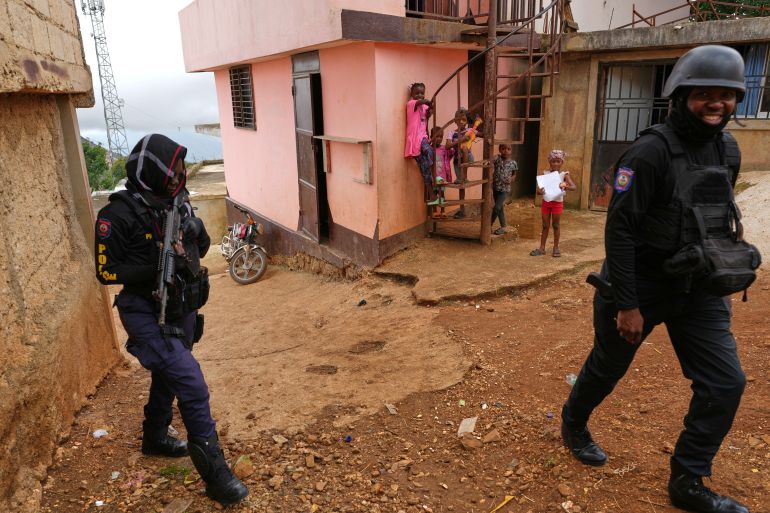US sanctions ex-police officer, gang leader in Haiti over criminal ties
The UN Security Council also sanctioned the two men and extended an arms embargo on Haiti in place since 2022.

Published On 17 Oct 202517 Oct 2025
Save
The United States Treasury has sanctioned two Haitians, one a former police officer and the other an alleged gang leader, for their affiliation with the Viv Ansanm criminal alliance.
On Friday, a Treasury news release accused Dimitri Herard and Kempes Sanon of colluding with Viv Ansanm, thereby contributing to the violence wracking Haiti.
Recommended Stories
list of 3 itemsend of list
The sanctions block either person from accessing assets or property in the US. They also prohibit US-based entities from engaging in transactions with the two men.
“Today’s action underscores the critical role of gang leaders and facilitators like Herard and Sanon, whose support enables Viv Ansanm’s campaign of violence, extortion, and terrorism in Haiti,” Bradley T Smith, the director of the US Office of Foreign Assets Control, said in a statement.
Since taking office for a second term, US President Donald Trump has sought to take a hardline stance against criminal organisations across Latin America, blaming the groups for unregulated immigration and drug-trafficking on US soil.
Trump has termed their actions a criminal “invasion”, using nativist rhetoric to justify military action in international waters.
Viv Ansanm has been part of Trump’s crackdown. On his first day in office, on January 20, Trump issued an executive order setting the stage for his administration to label Latin American criminal groups as “foreign terrorist organisations”.
That process began several weeks later. In May, Viv Ansanm and another Haitian criminal organisation, Gran Grif, were added to the growing list of criminal networks to receive the “foreign terrorist” designation.
Advertisement
Since the assassination of Haitian President Jovenel Moise in 2021, a power vacuum has formed in Haiti. The last national elections were held in 2016, and its last democratically elected officials reached the end of their terms in 2023.
That has created a crisis of public confidence that criminal networks, including gangs, have exploited to expand their power. Viv Ansanm is one of the most powerful groups, as a coalition of gangs largely based in the capital, Port-au-Prince.
In July, Ghada Waly, the executive director of the United Nations Office on Drugs and Crime, warned that the gangs now have “near-total control of the capital”, with 90 percent of its territory under their control.
Nearly 1.4 million people have been displaced in the country as a result of the gang violence, a 36 percent increase over 2024. Last year, more than 5,600 people were killed, and a further 2,212 injured.
In Friday’s sanctions, the US Treasury accused Herard, the former police officer, of having “colluded with the Viv Ansanm alliance”, including through training and the provision of guns.
It also noted that Herard had been imprisoned by Haitian authorities for involvement in the Moise assassination. He later escaped in 2024.
Sanon, meanwhile, is identified as the leader of the Bel Air gang, part of the Viv Ansanm alliance. The Treasury said he “played a significant role” in building Viv Ansanm’s power, and it added that he has been implicated in killings, extortion and kidnappings.
The UN Security Council echoed the US’s sanctions against Sanon and Herard, designating both men on Friday. It also agreed to extend its arms embargo on Haiti, which began in 2022.
In September, the UNSC also approved the creation of a “gang suppression force”, with a 12-month mandate to work with Haitian police and military. That force is expected to replace a Kenyan-led mission to reinforce Haiti’s security forces, and it is slated to include 5,550 people.
But on Friday, the Trump administration said that the UN had not gone far enough in its efforts to combat Haiti’s gangs. It called for more designations against individual suspects.
“While we applaud the Council for designating these individuals, the list is not complete. There are more enablers of Haiti’s insecurity evading accountability,” an open letter from US Ambassador Jennifer Locetta read.
“Haiti deserves better. Colleagues, we will continue pressing for more designations through the Security Council and its subsidiary bodies to ensure the sanctions lists are fit for purpose.”
Advertisement
